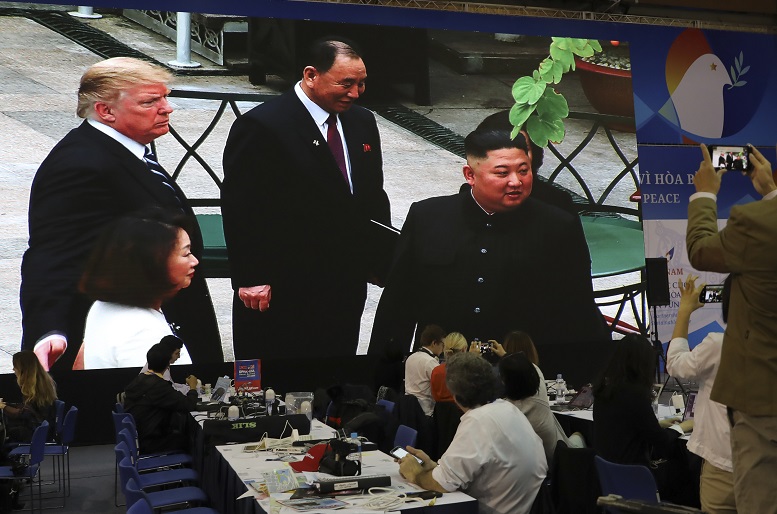News Analysis
Trump-Kim summit fails to produce deal: experts concur
Published : 28 Feb 2019, 21:23
Updated : 28 Feb 2019, 21:26
Things took a dramatic turn here on Thursday afternoon as the widely expected second summit between the Democratic People's Republic of Korea (DPRK) top leader Kim Jong Un and U.S. President Donald Trump failed to produce an agreement after some two days of discussion.
This was due to a "gap" over denuclearization and sanction relief issues between the two sides.
Kim and Trump skipped their planned lunch and signing ceremony of a joint statement, and Trump's solo press conference was held two hours ahead of schedule.
Explaining the reason for no agreement, Trump said, "Basically they (DPRK) want the sanctions lifted, in their entirety, and we couldn't do that. They were willing to denuke a large portion of the areas that we wanted, but we couldn't give up all sanctions for that. We'll continue to work on that and we'll see."
Paik Hak Soon, president of the Sejong Institute of South Korea, said the sticking point is the "sequence" of denuclearization on the Korean Peninsula. "It appears that the U.S. requirement from North Korea (the DPRK) included a list of nuclear facilities and ballistic missiles, and North Korea wanted a 'lifting’ of all sanctions. The two sides failed to agree on that matter," Paik said.
Yang Xiyu, a researcher from the China Institute of International Studies, said the failure showed that the two sides couldn't fix their differences on the DPRK's dismantling key nuclear facilities and U.S. reciprocal offers.
Wang Sheng, a professor of international politics at Jilin University, believed the outcome of the summit is "a bit surprising." The summit shows "the difference between the two sides on the concept, method and steps of denuclearization is still there, and the disparity of actions between the two sides always exists."
However, all experts acknowledged that this summit was "necessary" and laid a foundation for future negotiations and progress.
Paik agreed with Trump's saying at the press conference that "real progress" had been made at the second summit, and the summit "wouldn't be the last one."
"I think, even if the two sides didn't sign an agreement this time, the top leaders from the two countries sitting face to face to talk and reaffirming the existing problems are helpful to push forward the denuclearization and sanction relief in the future," he said. "From that point of view, it is an inevitable process."
Wang Junsheng, an international relations expert with the Chinese Academy of Social Sciences, believed the Hanoi summit was bound to be a "transitional deal" to connect the past and the future.
"Solving the nuclear issue on the Korean Peninsula tests not only sincerity, but also wisdom from the two sides," he said.
Yang said the denuclearization process on the Korean Peninsula has experienced twists and turns in the past, but it never stopped and never will, "as it suits everyone's interests, including the DPRK's."
Koh Yu Hwan, a professor who specializes in DPRK studies at South Korea's Dongguk University, suggested that both sides keep negotiating to narrow gaps, and other relevant countries, including South Korea and China, be included to help with the process.
Commenting on the outcome of the summit, Chinese Foreign Ministry spokesman Lu Kang said that the situation on the Korean Peninsula has seen a major turnaround and returned to the right track of political settlement over the last year. This result is hard won and should be cherished, he said.
Lu hoped the DPRK and the United States will continue to engage in dialogue, show sincerity to each other, respect and accommodate each other's legitimate concerns, and jointly promote denuclearization and the establishment of a peace mechanism on the Korean Peninsula.
"China will continue to play its constructive role," Lu said.


